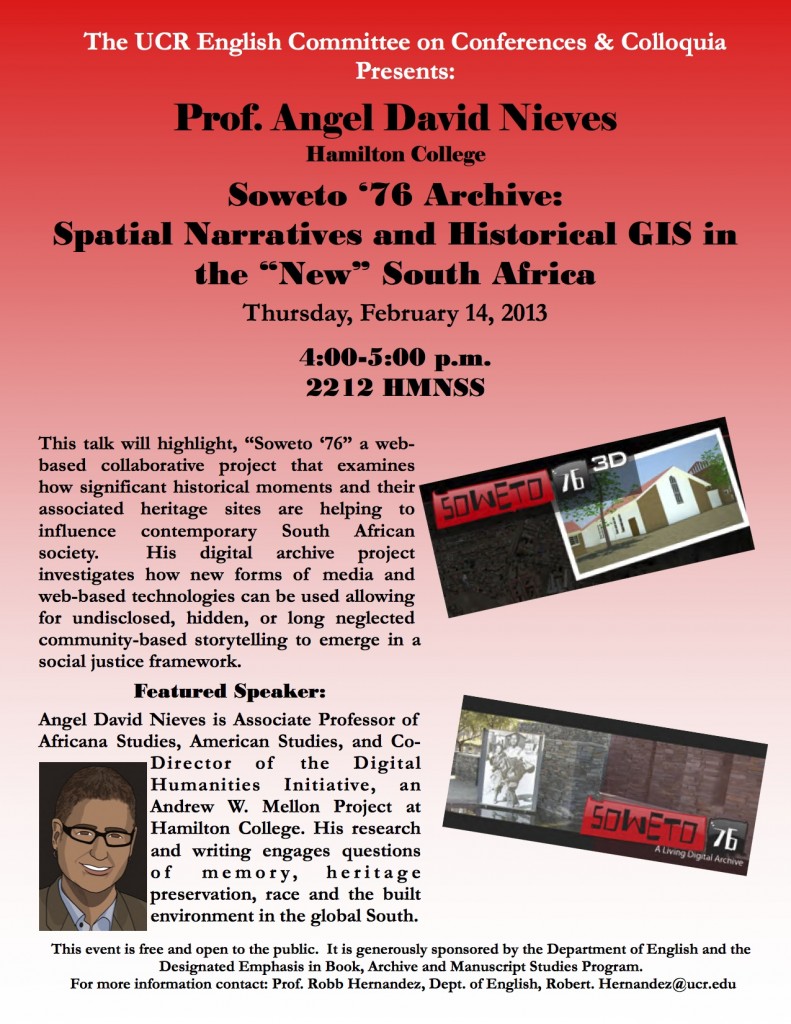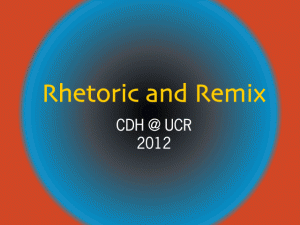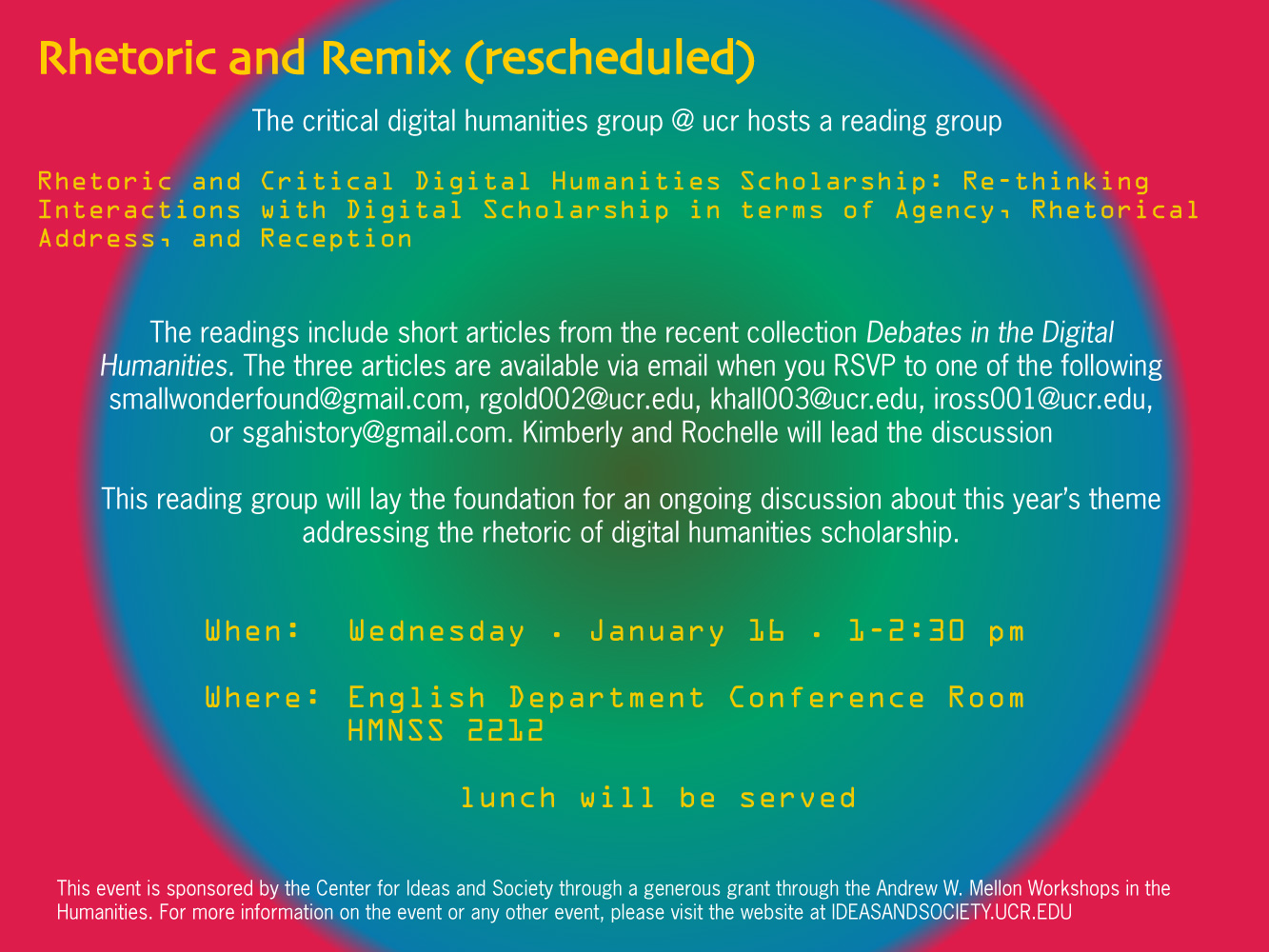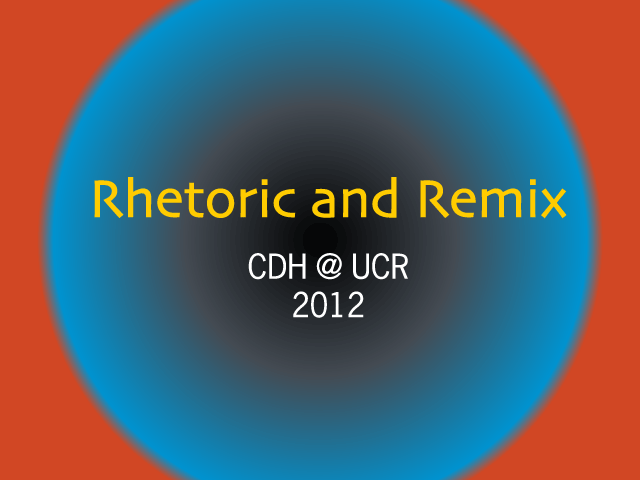This is a wonderful conference with many luminaries and many non-luminous but brilliant people. I highly recommend it.
SLSA CONFERENCE 2013: UNIVERSITY OF NOTRE DAME
The 27th Annual Meeting of the Society for Literature, Science, and the Arts
Location Notre Dame, Indiana. Venue University of Notre Dame. Dates October 3–6, 2013.
Site Coordinator: Laura Dassow Walls, Department of English, University of Notre Dame.
Program Chair: Ron Broglio, Department of English, Arizona State University.
Paper Proposal Due Date May 1, 2013. Notification of Acceptance June 15, 2013.
SLSA Membership Participants in the 2013 conference must be 2013 members of the Society for Literature, Science, and the Arts. For more information about SLSA, please visit the organization website at www.litsci.org.
Conference theme: PostNatural. What does it mean to come “after” nature? In 2012, Arctic ice melted to the lowest level in human history; with ice everywhere in retreat, island nations are disappearing, species vectors are shifting, tropical diseases are moving north, northern natures-cultures are moving into extinction. Acidification of ocean water already threatens Northwest shellfish farms, while historic wildfires, droughts, floods, and shoreline erosion are the norm. Reality overshoots computer models of global warming even as CO2 emissions escalate. Yet none of this has altered our way of living or our way of thinking: as Fredric Jameson noted, we can imagine the collapse of the planet more easily than the fall of capitalism. What fundamental reorientations of theory—of posthumanity and animality, of agency, actants, and aporias, of bodies, objects, assemblages and networks, of computing and cognition, of media and bioart—are needed to articulate the simple fact that our most mundane and ordinary lives are, even in the span of our own lifetimes, unsustainable? If we have never been natural, are we now, at last, ecological?
Topics and Questions include:
Resilience Theory and Panarchy Symbiosis after Margulis
Geological Time: Pliocene, Holocene, Anthropocene Ecologies of Mind
Literature, Theology & the New Ecology Simulated Ecosystems
Animality, Vegetality, & Somatic Natures Cosmopolitical Projects
Environmental Gaming & Gaming Environments Imagined Eco-Futures
Feminist & Diffractive Materialisms Beyond Gaia
the Language of Engineering, Control, Hacking and Techno-fixes Ecoterrorism and Nature Noir
Waste Lands: Stains, Toxins, Dumps, Refuse, Pollutions Globality vs. Planetarity
Nature, Post-Nature, and the Politics of Ecology
Unsustainability: in biological terms, can we “stain” to make the “unsustainable” visible?
Plenary Speakers include Timothy Morton and Subhankar Banerjee
Please Note: Like all SLSA conferences, this is an open conference where a wide range of work will be welcome. Proposed topics may take up any work in literature and science, history of science, philosophy of science, science and art, or science studies. “PostNatural” has been chosen as a theme to organize ongoing conference threads and invite a range of proposals from various dimensions of ecocriticism and environmental literature and history. For panel contributions, submit a 250-word abstract with title. Pre-organized panels for consideration may include an additional summary paragraph along with proposed session title. Roundtable and alternative format panels are encouraged. Submit all proposals and register for the conference athttp://www.litsci.org/slsa13, starting in February 2013.
Submissions: For panel contributions, submit a 250-word abstract with title. Pre-organized panels for consideration may include an additional summary paragraph along with proposed session title. Roundtable and alternative format panels are encouraged. Submit all proposals and register for the conference athttp://www.litsci.org/slsa13 starting in February 2013.
Travel Awards
SLSA provides a limited number of travel awards for underfunded individuals attending the annual conference. Members of SLSA who present at the annual conference may apply for travel subventions. An applicant should email name, title of SLSA presentation, an indication of how long one has been a member of SLSA, and any information about funding for the conference to the Executive Director at carol.colatrella@lmc.gatech.
Post-Graduate Program in New Zealand: Geographies of Media Convergence
January 27th, 2013
April Durham
The School of English and Media Studies is currently seeking applicants for postgraduate scholarships at Massey University Wellington (New Zealand) for a research project that is externally funded by the Marsden Fund of the New Zealand Royal Society and entitled, “Geographies of Media Convergence: Spaces of Democracy, Connectivity and the Reconfiguration of Cultural Citizenship.”
There are scholarships available at both Masters (one year fulltime) and PhD (three years fulltime) levels. We welcome applicants who wish to develop their research interests within our overall project theme. We welcome applications from indigenous scholars and Latin American(ist) scholars and scholars working at the intersection of human geography and media studies.
Master’s Scholarship
This scholarship is for a 1-year fulltime Master’s degree (MA or MPhil) by thesis (i.e., no coursework is involved). It will be awarded to an applicant with a high GPA and a Bachelor’s degree in Media Studies, Cultural Studies, Geography, or a cognate discipline. It covers living costs as well as the full domestic component of tuition fees. The total value of the scholarship is NZD $16,000 plus up to $6,000 in fees. It is open to New Zealand domestic and international students (though international students would be required to provide their own source of funding to make up the shortfall between the domestic and international tuition fees).
PhD Scholarship
This scholarship is for a fulltime 3-year PhD degree (which in New Zealand is a degree by research that does not include a coursework component). It will be awarded to an applicant with a high GPA and a Master’s degree in Media Studies, Cultural Studies, Geography, or a cognate discipline. It covers living costs as well as full domestic tuition fees. It is open to New Zealand domestic as well as international students. The total value of the scholarship is NZD75,000 (NZD25,000 pa) plus fees of up to $6,000 per annum for three years.
Project Summary
We are currently living through a period in which centralized forms of media, such as national television and mainstream journalism, are perceived to be in crisis. This crisis is creating new spaces for the development of alternative ways of knowing, watching and making media. Along with them, media convergence has emerged as a multidimensional concept that references expanding interconnections and interactivity between media technologies, sites, users and production processes, as well as increasingly interactive relationships between politics and popular media cultures. Technological development, media convergence, and attendant transformations of everyday media production, circulation and consumption practices are giving rise to new forms of political discourse and involvement. The proposed research seeks to delineate the possibilities and limitations for contemporary social transformation within this new media ecology. We will do this by exploring a series of media forms, discourses, practices and technologies (including indigenous people’s media as well as contemporary developments in entertainment television) whereby new kinds of cultural citizenship are being actively forged.
This project is thus designed to advance incipient dialogues between human geography and media studies by asking how practices within popular cultures of media convergence can contribute to the construction or renovation of democratic citizenship. The researchers involved with this project will analyze processes of media convergence whereby diverse groups in different parts of the world are actively fashioning new forms of political engagement, identity production and cultural citizenship. The research team will thus explore significant sites of media activity for the production of new political imaginaries within the current global historical conjuncture, which is characterized by four key interrelated elements: 1) the appearance and expansion throughout the world of resurgent and increasingly networked indigenous social movements; 2) the emergence of a highly elaborated and complex convergent media ecology marked by rapid technological development, digitalization, miniaturization and mobilization; 3) the rise and spread of neoliberalism, which is increasingly subject to growing contestation, particularly within Latin America; and 4) increased securitization and militarization organized at multiple levels of social life particularly since September 11, 2001. Within this broad historical conjuncture, areas of focus within our project include 1) the expansion of indigenous television in different parts of the world; and 2) the ongoing transformation of entertainment TV and concomitant proliferation of new modes of interactive engagement with such media by digitally empowered citizens. We propose to examine the processes of convergence culture at work within these phenomena in order to identify and analyze citizenship and citizen-like practices that are occurring across different media formats and platforms.
Application Details
• The closing date for applications is Tuesday, 22 February, 2013
• The preferred starting date for the scholarship is 1 April 2013 (though this is negotiable)
• All applications must be submitted in paper form to and must be postmarked no later than the application closing date. To expedite the review of applications, we encourage you to also submit an electronic version of your application to this email address: j.a.mckenzie@massey.ac.nz
• Your application should include the following:
1. A brief cover letter that contains contact details and your preferred starting date
2. A 1000-word proposal outlining your proposed thesis research and how it fits with the aims of the project
3. Your CV
4. A sample of your academic writing (e.g., for PhD applicants, a published article from an academic journal, Masters thesis chapter, seminar paper, etc.; for Masters applicants, a paper from an upper division undergraduate or Honours-level course).
• Two letters of recommendation from persons competent to speak about your academic record at University level must be sent separately to the project supervisors via the email addresses below.
Further information and instructions on how to apply can be found at:
http://www.massey.ac.nz/?
Informal enquiries about the scholarships prior to the deadline can also be directed to the project supervisors: julie.cupples@ed.ac.uk and K.T.Glynn@massey.ac.nz
Debates in the Digital Humanities is now available online as an open source, and free, project of CUNY:
For those attending the CDH Rhetoric and Remix Reading Group on January 16th, the three articles from Debates in the Digital Humanities are available at the links below:
Lisa Sipro, “This is Why We Fight: Defining the Values of the Digital Humanities”
Alan Liu, “Where is the Cultural Criticism in the Digital Humanities”
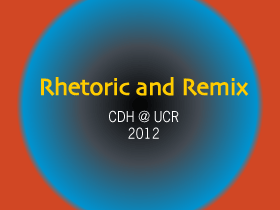 The Critical Digital Humanities group at UCR announces a reading group:
The Critical Digital Humanities group at UCR announces a reading group:
“Rhetoric & Critical Digital Humanities Scholarship: Rethinking Interactions with Digital Scholarship in terms of Agency, Rhetorical Address, and Reception”
The readings include short articles from the recent collection Debates in the Digital Humanities. The three articles are available by emailing your RSVP. Please see the flier below for the addresses. Kimberly and Rochelle will lead the discussion
This reading group will lay the foundation for an ongoing discussion about this year’s theme addressing the rhetoric of digital humanities scholarship.
WHEN: Wednesday . January 16 TIME: 1-2:30
WHERE: English Department Conference Room . HMNSS 2212
lunch will be served!
The three articles from Debates in the Digital Humanities are also available at the links below:
Lisa Sipro, “This is Why We Fight: Defining the Values of the Digital Humanities”
Alan Liu, “Where is the Cultural Criticism in the Digital Humanities”
This event is sponsored by the Center for Ideas and Society through a generous grant from the Andrew W. Mellon Workshops in the Humanities.
The Rhetoric & Remix Reading Group meeting today has been postponed.
The event will be rescheduled for the Winter quarter.
I made some changes to the website recently, and most of the changes are based on the new features of the WordPress Jetpack plugin.
1. I removed the Disqus commenting system.
– Disqus has been moving toward becoming a social network of its own, and there was just too much complexity being added to the commenting procedure.
– Comments are now handled solely within WordPress with the Jetpack plugin, and commenters can sign-in to make a comment with their Twitter, Facebook, or WordPress credentials.
– All of the old comments are still there too.
2. The Photon feature of the Jetpack plugin is now active.
– Using the Photon feature allows for integration of our WordPress.org installation with WordPress.com’s CDN (Content Delivery Network).
– This means that images and other information will load faster across the web.
3. We’re now using the Publicize feature of the Jetpack plugin for auto-posting to social networks.
– Previously we were using the “WP to Twitter” plugin which had some hiccups, but only because of Twitter changing their API. Hopefully there will be fewer missteps with the Jetpack plugin.
– Also, we were using Hootsuite to post to Facebook, but I didn’t like this setup. Hootsuite is okay for managing multiple social networking accounts (for a fee), but rather than using a direct-post to Facebook, Hootsuite relies on RSS. There would often be a delay of hours for the WordPress RSS to be read by Hootsuite, and then hopefully Hootsuite would send that info to Facebook. With the Jetpack Publicize feature, things are working much more quickly, and reliably.
– Sadly, Google+ still doesn’t have a public API available for auto-posting.
4. Backups of the site have been made – both a full FTP download, as well as an export of the site’s posts and info.
5. Lastly, I changed the social networking or sharing buttons so they show at the bottom of posts, but they do not show on the front page.
If anyone would like other changes or tweaks, please let me know.
This event has been rescheduled – please see this post for details:
http://cdh.ucr.edu/2013/01/06/rhetoric-and-remix-reading-group-rescheduled/
The Critical Digital Humanities group at UCR announces a reading group:
“Rhetoric & Critical Digital Humanities Scholarship: Rethinking Interactions with Digital Scholarship in terms of Agency, Rhetorical Address, and Reception”
The readings include three short articles from the recent collection Debates in the Digital Humanities and Bernard Stiegler’s book, For a New Critique of Political Economy. Participants should obtain the Stiegler book as we will be discussing it in its entirety.
This reading group will lay the foundation for an ongoing discussion about this year’s theme addressing the rhetoric of digital humanities scholarship.
WHEN: rescheduled for January 16th, 1-2:30pm
WHERE: English Department Conference Room . HMNSS 2212
lunch will be served!
This event is sponsored by the Center for Ideas and Society through a generous grant from the Andrew W. Mellon Workshops in the Humanities.
This is a fantastic conference that is devoted to interdisciplinary exploration of topics of concern to anyone working in, with, or around the digital humanities. The conference for next year is at Notre Dame and the deadline for submissions is April 15. Plenty of time to plan a panel!!
27th Annual Conference of the SLSA (Society for Literature, Science, and the Arts)
- POSTNATURAL?
- October 3-6, 2013
- The Campus of the University of Notre Dame
- Proposals due: April 15, 2013
Last year panels included papers by Katherine Hayles, Cary Wolfe, Mark Hansen, and plenty of non-celeb scholars who discussed questions of the “Non-Human” relative to literature, art, humanities generally, and science. They are open to panel proposals and individual papers.
Despite its title Stephen Marche’s article, “Literature is not Data: Against Digital Humanities,” is more against the algorithmic era we currently live in than the digital humanities. Marche writes that “algorithms are inherently fascistic,” but the concern is really about readability.
Algorithms are a tool for distant reading, as Marche states; however, the problem arises when algorithms need to be read themselves. A close reading of an algorithm is problematic, except of course for those mathematicians, computer scientists, and other professionals trained in such procedures. Overall, it is difficult to see whether Marche is really worried about the power wielded by the creators of the algorithms, or the social acceptance of relying on algorithms in general.
The irony of Marche’s misguided polemic is its underlying call for a greater understanding of the “smooth machines” that run the algorithmic code. Instead of being against the digital humanities, Marche is really pointing to a change in modern society, a detachment from the visceral world of the analog to the somewhat intangible, but very material world of the digital.
Marche’s anxiety expresses itself first through the amorphous nature of the burgeoning digital humanities. Marche then skewers academia, complains about Google, and shudders in fear of an electronic, financial armageddon. For Marche, literature is something to be handled, touched, and loved. Data, in contrast, is lifeless, meaningless, and untrustworthy.
Algorithms are not inevitable, and they are not perfect, but they are definitely part of the modern technological world we live in. The goal of the digital humanities is not to be “the next big thing,” but to understand the bigness of the algorithms that are already all around us.

